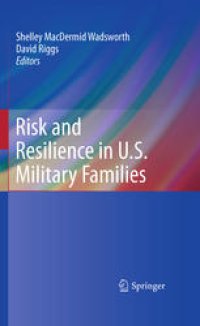
Ebook: Risk and Resilience in U.S. Military Families
- Tags: Psychotherapy and Counseling
- Year: 2011
- Publisher: Springer-Verlag New York
- Edition: 1
- Language: English
- pdf
Among the costs of the ongoing wars in Afghanistan and Iraq are the human losses -- over 5,000 dead and over 35,000 wounded. Additionally, service personnel often return with traumatic brain injuries, missing limbs, and severe psychological disorders. All of this exacerbates the stress that family members have had to endure since initial deployment. Written by military and civilian scholars across the medical and mental health fields, Risk and Resilience in Military Families focuses on four key areas of research: marital functioning, parenting and child outcomes, family sequelae of wounds and injuries, and single service members (who comprise half of currently active troops). The results are up-to-date (and occasionally surprising) findings on psychological health issues affecting service members and their loved ones, and proven strategies for promoting family resilience, intervening to reduce dysfunctional behavior, and guiding families through the recovery process. Training issues and recommendations for further research round out this singular volume.
Included among the topics:
•Deployment: Risk or protective factor for couples? •A community program for “secretive problems” (e.g., drug abuse) in the military. •Interventions for the combat-injured family. •Trauma, PTSD, and partner violence. •The deployment experience for children of service members. •The single mother in the military.
An important text for researchers and academics in family and military studies, as well as for social workers, providers, and policymakers, Risk and Resilience in Military Families offers innovative coverage of a distinctive population and its unique needs.
Among the costs of the ongoing wars in Afghanistan and Iraq are the human losses -- over 5,000 dead and over 35,000 wounded. Additionally, service personnel often return with traumatic brain injuries, missing limbs, and severe psychological disorders. All of this exacerbates the stress that family members have had to endure since initial deployment. Written by military and civilian scholars across the medical and mental health fields, Risk and Resilience in Military Families focuses on four key areas of research: marital functioning, parenting and child outcomes, family sequelae of wounds and injuries, and single service members (who comprise half of currently active troops). The results are up-to-date (and occasionally surprising) findings on psychological health issues affecting service members and their loved ones, and proven strategies for promoting family resilience, intervening to reduce dysfunctional behavior, and guiding families through the recovery process. Training issues and recommendations for further research round out this singular volume.
Included among the topics:
•Deployment: Risk or protective factor for couples? •A community program for “secretive problems” (e.g., drug abuse) in the military. •Interventions for the combat-injured family. •Trauma, PTSD, and partner violence. •The deployment experience for children of service members. •The single mother in the military.
An important text for researchers and academics in family and military studies, as well as for social workers, providers, and policymakers, Risk and Resilience in Military Families offers innovative coverage of a distinctive population and its unique needs.